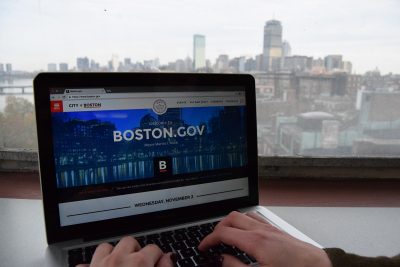
Boston Mayor Martin Walsh announced Oct. 27 that the city would release its source codes for its official website Boston.gov, which will allow outside organizations and academic institutions like Boston University to improve and collaborate on new features, according to a press release.
The move, which took place three months after the launch of a redesigned Boston.gov, was led by the city’s Digital Team, which is part of the city’s Department of Innovation and Technology. The move makes Boston the first major American city to open source its entire website, the release stated.
Open sourcing means software developers can view the website’s code and propose changes and improvements for the website on GitHub, a site that people use to build software.
Lauren Lockwood, the city’s chief digital officer, wrote in an email that the open sourcing has been in development since three months ago.
“The idea has been in the works since before the project began and is part of the reason we selected an open source content management system (drupal) to build the site on,” Lockwood wrote.
Walsh said in the release that the open sourcing of the city’s website would cater to the people’s needs and further enhance the website.
“The City’s website will have to constantly evolve and change to meet the needs of the people of Boston,” Walsh said in the release. “By open sourcing Boston.gov, we’re opening up our website to a community of software developers and designers who can help us build for the future.”
BU’s Software and Application Innovation Lab was the first outside group to request access into the city website’s codes, Lockwood wrote.
Andrei Lapets, the director of SAIL and the Rafik B. Hariri Institute for Computing and Computational Science and Engineering at BU, said the city allowing outside contributors to edit or add to the website source code can cut the website’s improvement costs without deteriorating its quality.
“Allowing collaborators to offer their contributions can be an effective way to improve and extend the website without having the City of Boston incur those costs directly,” Lapets said. “This has been a successful approach for a very large fraction of the software systems on which many modern services and infrastructures rely.”
Lapets said SAIL was able to be involved after collaborating with the city for numerous years on various projects.
“There’s a lot of different things going on within the Hariri Institute, within BU, related to smart cities right now. We anticipate that this will continue,” Lapets said. “These are all discussions that we’re having with the City of Boston about how we could leverage common interests and common resources to help each other with smart city initiatives.”
Azer Bestavros, the founding director of the Hariri Institute, said although the coding is open to the public to see and change, there are minimal security risks because all of the programmers looking at it will catch any bugs in the coding itself.
“You’re going to be actually using … the eyeballs and the brains of thousands of software developers,” Bestavros said. “It is now an increasingly accepted argument that open sourced software could potentially be, or eventually will be, or already is, more secure.”
Lockwood said the city made the decision to open up the website to allow for more of an input from the Boston community.
“Opening the code for Boston.gov allows us to democratize the development of Boston.gov, incorporating contributions from individuals, academic institutions, and other organizations,” Lockwood wrote. “If you have ideas about ways to improve Boston.gov, you can submit an issue describing the idea or even build the new feature and contribute that code to the website.”
Several Boston residents said releasing the source codes would bring the city government closer to its people.
Lauren Prozeller, 31, of South Boston, said by allowing the public to suggest changes to the website, the city government is listening to residents’ aspirations.
“That’s pretty good if it’s increasing the usability of the website,” she said. “It just makes it more user-friendly and adds features that consumers want.”
Derrick Smith, 64, of Dorchester, said even though he does not know much about the technological development, the open sourcing serves a bridge between Boston and its people.
“If they use [the suggestions], they will work together [with the public],” he said. “I don’t think that’s bad.”
Peter Johnson, 31, of Roxbury, said it is useful to share the codes for other people who want to model their website similar to how Boston.gov is set up.
“It’s just free information for everybody for those who need it,” he said. “Knowledge is power, so the more you know, the better it is.”






















































































































